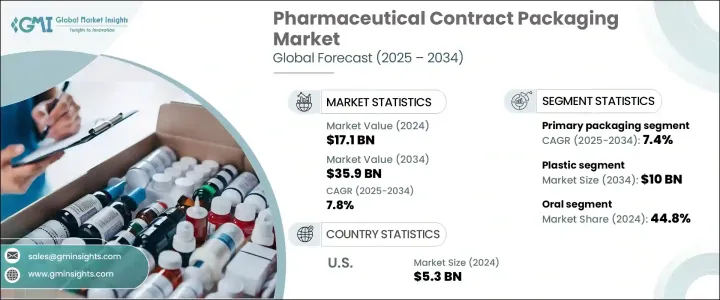
세계의 의약품 위탁 포장 시장은 2024년에는 171억 달러로 평가되었고, 2034년에는 359억 달러에 달할 것으로 추정되며, CAGR 7.8%로 성장할 전망입니다. 제약 부문 전반에 걸친 급격한 변화는 의약품 포장 및 배송 방식에 큰 영향을 미치고 있습니다. 개인 맞춤형 치료법에 대한 수요가 증가하고 생명공학 혁신이 발전함에 따라 제약 제조업체는 진화하는 요구 사항을 해결하기 위해 전문 위탁 포장 서비스 제공업체에 점점 더 의존하고 있습니다. 의약품 개발이 더욱 표적화되고 소량 생산이 주목받으면서 포장 솔루션은 민첩하고 규정을 준수하며 다양한 제형과 민감한 제형을 처리할 수 있어야 합니다.

위탁 포장 파트너는 변화하는 규제 프레임워크, 강화된 추적성 요구, 증가하는 환자 중심 치료 모델에 맞춰 확장 가능한 서비스를 제공함으로써 중추적인 역할을 하고 있습니다. 의약품 생산 및 유통의 글로벌 입지가 확대됨에 따라 국제 시장 전반에서 보안, 품질, 규제 준수를 보장하는 간소화된 포장 프로세스의 필요성이 더욱 강조되고 있습니다. 자동화 및 스마트 포장 도구와 결합된 디지털 혁신은 공급망 전반의 안전성을 강화하는 동시에 효율성을 높이고 있습니다. 지속 가능성이 주요 우선순위가 되면서 기업들은 성능 저하 없이 환경에 미치는 영향을 줄이기 위해 친환경 소재를 통합하고 있습니다.
| 시장 범위 | |
|---|---|
| 시작 연도 | 2024년 |
| 예측 연도 | 2025-2034년 |
| 시작 금액 | 171억 달러 |
| 예측 금액 | 359억 달러 |
| CAGR | 7.8% |
2차 포장 분야는 2034년까지 143억 달러에 달할 것으로 예상되는 등 상당한 성장을 보일 것으로 예상됩니다. 일련화 의무화, 변조 방지 기능, 정보 제공 라벨링이 고급 2차 포장 서비스에 대한 수요 증가를 촉진하고 있습니다. 특히 처방약과 일반 의약품의 경우 QR코드와 디지털 인터페이스를 통해 실시간 확인과 환자 참여도를 높일 수 있는 스마트 포장 형식이 선호되고 있습니다. 글로벌 친환경 포장 이니셔티브에 따라 재활용 판지, 친환경 잉크, 수성 코팅은 특히 지속 가능성과 최종 사용자의 접근성을 개선하기 위해 설계된 2차 포장 분야에서 주목을 받고 있습니다.
의약품 위탁 포장 분야의 플라스틱 부문은 2034년까지 100억 달러의 매출을 창출할 것으로 예상됩니다. 비용 효율성과 우수한 차단 특성으로 잘 알려진 플라스틱은 다양한 의약품 제형에 걸쳐 여전히 주요 소재로 사용되고 있습니다. 그러나 환경에 대한 관심이 높아지면서 생분해성 및 재활용이 가능한 플라스틱으로 시장이 변화하고 있습니다. 이에 따라 위탁 포장 제공업체는 지속 가능성 목표를 지원하면서 제품 무결성을 유지하는 경량 바이오 기반 소재 및 고차단성 바이오 플라스틱과 같은 차세대 플라스틱 솔루션을 개발하고 있습니다.
미국의 의약품 위탁 포장 시장은 엄격한 규제 기준과 진화하는 일련화 요건으로 인해 2024년에 53억 달러의 매출을 기록할 것으로 예상됩니다. 의약품 공급망 보안법(DSCSA)의 시행으로 단위 단위 추적성, 블록체인 통합, 스마트 라벨링 기술의 자동화가 장려되었습니다. 생물학적 제제, 유전자 및 세포 치료, 온도에 민감한 의약품의 성장으로 인해 서비스 제공업체는 수요를 충족하기 위해 콜드 체인 포장 인프라를 강화해야 합니다.
세계의 의약품 위탁 포장 시장의 주목할만한 업체는 Ameripac, Amcor, Baxter Biopharma Solutions, Adare Pharma Solutions, Catalent Pharma Solutions등이 있습니다. 이들은 규정 준수, 추적성 및 사용자 상호 작용을 개선하기 위해 자동화, 일련화, NFC 및 QR과 같은 스마트 포장 기술을 활용하고 있습니다. 제약 개발자와의 초기 단계 협력과 지속 가능한 재료에 대한 강조는 위탁 포장업체가 미래에 대비한 맞춤형 포장 솔루션을 제공하는 데 도움이 되고 있습니다.
The Global Pharmaceutical Contract Packaging Market was valued at USD 17.1 billion in 2024 and is estimated to grow at a CAGR of 7.8% to reach USD 35.9 billion by 2034. Rapid transformations across the pharmaceutical sector are significantly influencing the way medications are packaged and delivered. With rising demand for personalized therapies and advancements in biotech innovation, pharmaceutical manufacturers are increasingly turning to specialized contract packaging providers to address evolving needs. As drug development becomes more targeted and small-batch production gains traction, packaging solutions must be agile, compliant, and capable of handling diverse dosage forms and sensitive formulations.

Contract packaging partners are playing a pivotal role by offering scalable services that align with shifting regulatory frameworks, heightened traceability demands, and growing patient-centric care models. The expanding global footprint of pharmaceutical production and distribution further underscores the need for streamlined packaging processes that ensure security, quality, and regulatory alignment across international markets. Digital transformation, coupled with automation and smart packaging tools, is elevating efficiency while reinforcing safety throughout the supply chain. As sustainability becomes a major priority, companies are also integrating eco-conscious materials to reduce environmental impact without compromising performance.
| Market Scope | |
|---|---|
| Start Year | 2024 |
| Forecast Year | 2025-2034 |
| Start Value | $17.1 Billion |
| Forecast Value | $35.9 Billion |
| CAGR | 7.8% |
The secondary packaging segment is anticipated to witness substantial growth, with expectations to reach USD 14.3 billion by 2034. Serialization mandates, tamper-proof features, and informative labeling are fueling the rise in demand for advanced secondary packaging services. Smart packaging formats are becoming a preferred choice, especially for prescription and over-the-counter medications, as they enable real-time verification and enhanced patient engagement through QR codes and digital interfaces. In line with global green packaging initiatives, recycled cartonboard, eco-friendly inks, and water-based coatings are gaining traction, especially in secondary packaging applications designed for improved sustainability and end-user accessibility.
The plastic segment in the pharmaceutical contract packaging space is projected to generate USD 10 billion by 2034. Known for its cost efficiency and excellent barrier properties, plastic remains a dominant material across a wide range of drug formulations. However, increasing environmental concerns are steering the market toward biodegradable and recyclable plastics. In response, contract packaging providers are developing next-generation plastic solutions, such as lightweight bio-based materials and high-barrier bioplastics that maintain product integrity while supporting sustainability goals.
United States Pharmaceutical Contract Packaging Market generated USD 5.3 billion in 2024, driven by stringent regulatory standards and evolving serialization requirements. The implementation of the Drug Supply Chain Security Act (DSCSA) has encouraged unit-level traceability, blockchain integration, and automation of smart labeling technologies. Growth in biologics, gene and cell therapies, and temperature-sensitive drugs is pushing service providers to enhance cold chain packaging infrastructure to meet demand.
Notable players in the Global Pharmaceutical Contract Packaging Market include Ameripac, Amcor, Baxter Biopharma Solutions, Adare Pharma Solutions, and Catalent Pharma Solutions. Companies are leveraging automation, serialization, and smart packaging technologies such as NFC and QR to improve compliance, traceability, and user interaction. Early-stage collaboration with pharmaceutical developers and an emphasis on sustainable materials are helping contract packagers deliver customized, future-ready packaging solutions.